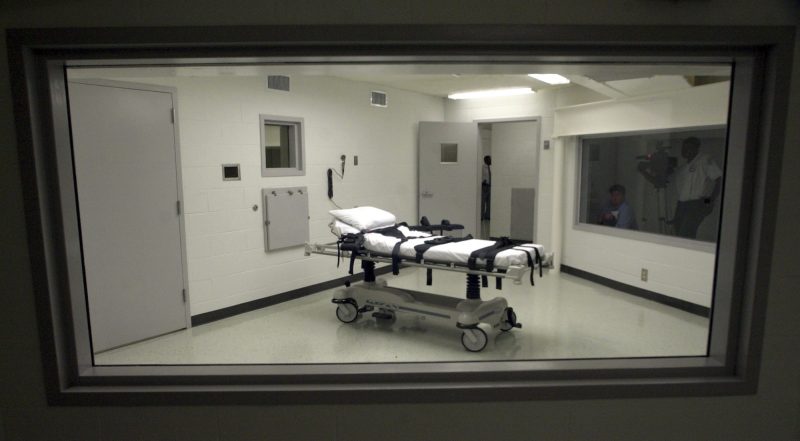The Supreme Court on Wednesday cleared the way for Alabama officials to execute a death row prisoner using nitrogen gas, a method critics say is untested and lacks sufficient safety protocols.
Kenneth Eugene Smith, convicted in a 1988 murder-for-hire scheme, asked the high court to intervene days before his scheduled execution Thursday evening. It was the latest legal battle over how states that allow the death penalty execute prisoners.
The court’s brief order gave no reasons, and there were no noted dissents.
Alabama officials previously tried to execute Smith in November 2022 by lethal injection but failed to find a vein through which they could administer the drugs, leaving him strapped to a gurney for hours, his lawyers said. Officials scheduled a new date and planned to administer nitrogen hypoxia — a method that has never been used in an execution by any state or the federal government.
Smith’s lawyers told the justices that the state’s attempt to carry out the execution a second time amounted to cruel and unusual punishment in violation of the U.S. Constitution.
The court’s conservative majority does not typically grant requests to delay executions, but Smith’s lawyers said in a court filing Tuesday that it is “difficult to imagine a more exceptional case than one where a state intends to make a second attempt to execute a person by a never-before-used method of execution after having already subjected that same person to hours of superadded pain while trying and failing to execute him by a different method 14 months earlier, resulting in serious (and persistent) physical and emotional torment.”
Alabama Attorney General Steve Marshall (R) pushed back on those concerns, telling the justices in a court filing that nitrogen gas is “perhaps the most humane method of execution ever devised.”
Lawyers for the state said an Alabama appeals court was correct to reject Smith’s constitutional claim that his execution should be halted, pointing to a case from the 1940s involving a failed electrocution. “Alabama attempted to establish an IV and never administered the lethal injection drugs,” the filing said. “If a second attempted electrocution is constitutional, so is Smith’s execution by nitrogen hypoxia.”
Alabama Gov. Kay Ivey (R) suspended lethal injections in 2022 pending review days after the failed attempt to execute Smith — the state’s second botched execution attempt in three months, and the third in four years.
The Biden administration separately issued a moratorium on federal executions in 2021. But states can conduct them, and the moratorium does not prohibit federal prosecutors from seeking new death sentences. The Justice Department announced plans this month to seek the death penalty for the man who fatally shot 10 Black people in a racist rampage at a Buffalo grocery store in 2022.
Smith is on death row in Alabama for his role in the murder of 45-year-old Elizabeth Sennett in March 1988. Sennett was stabbed and beaten with a fireplace implement in what was staged to look like a home invasion and burglary at her Colbert County, Ala., home, court records show.
Investigators determined that she was killed in a murder-for-hire plot by her husband, a debt-riddled Church of Christ preacher named Charles Sennett, to trade her life for insurance money. Charles Sennett contacted a man who then recruited two men to kill Elizabeth Sennett. One of them was Smith, who has said that he didn’t stab the woman. Charles Sennett paid the men $1,000 each — the equivalent of about $2,600 in today’s dollars.
After the state was unable to access Smith’s veins and called off his planned execution in 2022, state officials said, Smith chose nitrogen gas as his “preferred method of execution.”
Smith’s lawyers said their client was not asking the Supreme Court to rule on the constitutionality of the use of nitrogen gas, but whether the Eighth Amendment prohibits a second attempt to execute him after the failed attempt.
But Alabama’s lawyers kept the issue of nitrogen gas at the center of their argument that the execution should go forward.
Capital defense lawyers have criticized as unfair the burden death row prisoners face in challenging an execution method as unconstitutional: A 2015 U.S. Supreme Court ruling involving Oklahoma inmates held that to successfully challenge one method, prisoners must propose a workable alternative.
Alabama approved nitrogen hypoxia as an alternative execution method in 2018 and said the state’s death row prisoners could opt to die that way instead of through lethal injection, which was the default method. Smith did not elect nitrogen hypoxia at that time, arguing that he could not make an informed decision.
But he did note the nitrogen gas alternative when he challenged his planned execution by injection in 2022. Alabama lawyers said that Smith’s acknowledgment of the nitrogen-gas method amounted to opting in.
Smith has said through his filings that he does not want to be executed by nitrogen gas, even though he acknowledged it as an option. The method involves piping gas through a face mask until the inmate’s oxygen is depleted and he is breathing only nitrogen, leading to death, according to the state’s heavily redacted protocol.
In media interviews, Smith has called the prospect terrifying.

